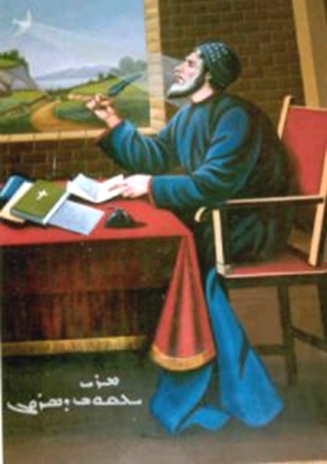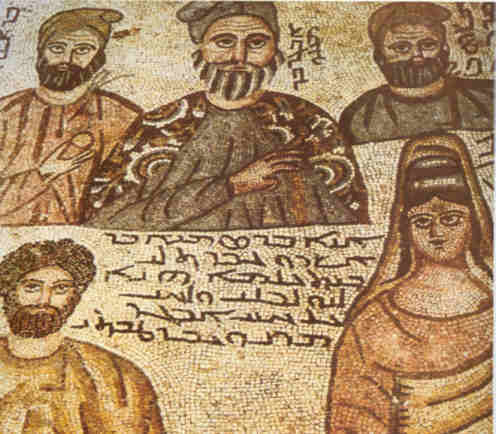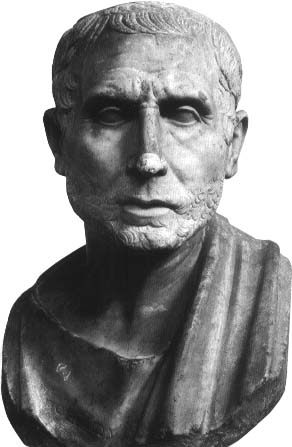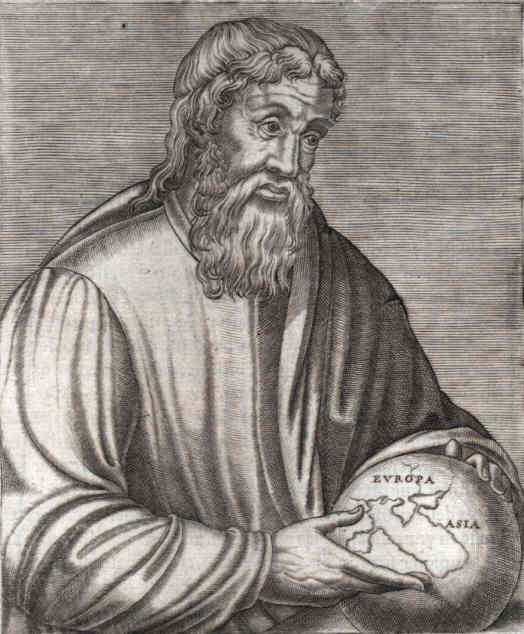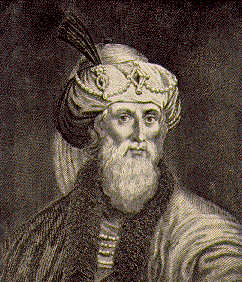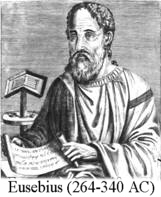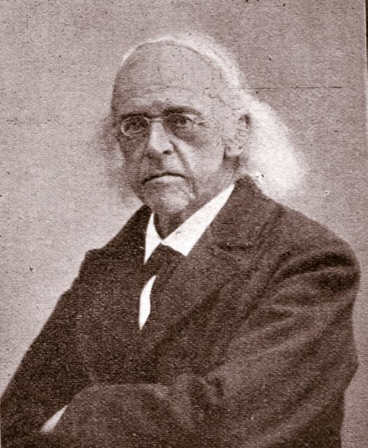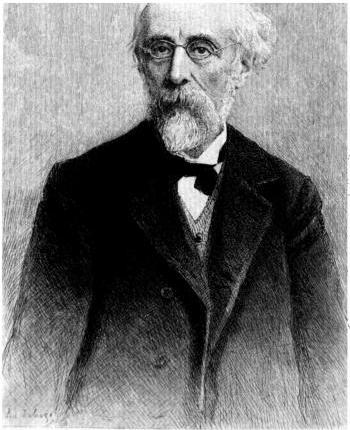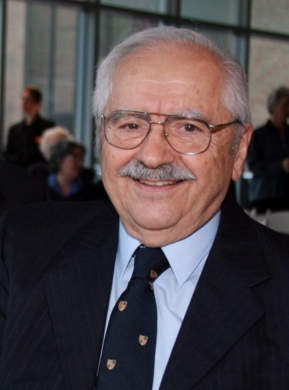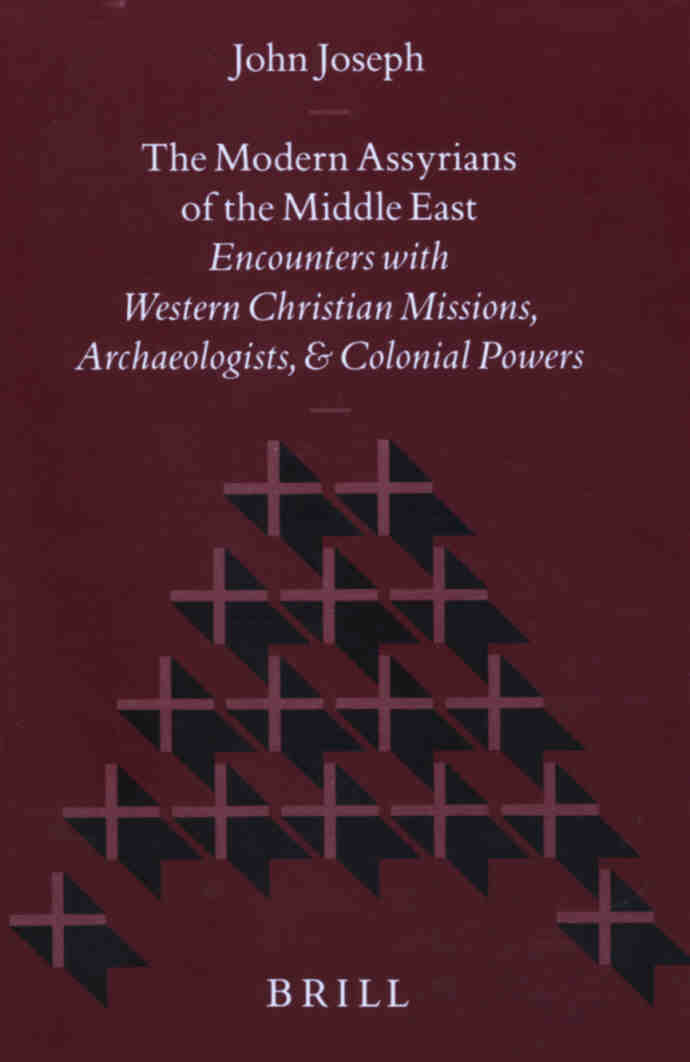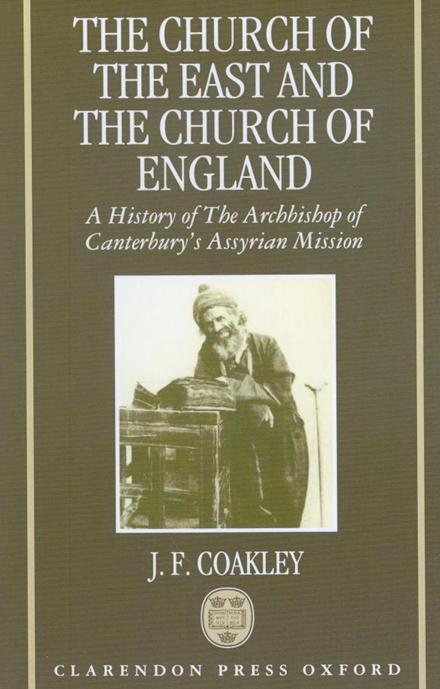|
Jacob of Sarug
Who made the East- Aramean Nestorians known as "Assyrians"?
SUA/WCA and allowing terrorism
Aramean history, history, culture and language, a six partite interview
26-6-2007: Aram Nahrin: the Aramaeans, the Bible, Christianity, and the West
27-6-2007: Aramaic: the Millennia Long Trajectory of the Global Language
28-6-2007: Gabriel Sengo opens the Gates of Aramaean Thought, Culture and Wisdom
2-7-2007: Do not Call the Illustrious Nation of Aramaeans by the Misnomer 'Assyrians'!
2-7-2007: Extermination of the Aramaean Nation: Results of an Anglo – French Plan
(Photo: wikipedia.org) The Historian Poseidonios from Apamea (ca. 135 BC - 51 BC), was a Greek Stoic philosopher, politician, astronomer, geographer, historian, and teacher. He says: " "The people we Greek call Syrians, they call themselves Arameans" From: See J.G. Kidd, Posidonius (Cambridge Classical Texts and Commentaries, 1988), vol. 2, pt. 2, pp. 955-956)
(Photo: wikipedia.org) Strabo (born 63 BC or 64 BC, died ca. 24 AD), a Greek historian, geographer and philosopher is mostly famous for his Geographika ("Geography") He says: "Poseidonius conjectures that the names of these nations also are akin; for, says he, the people whom we call Syrians are by the Syrians themselves called Arameans." (From: The Geography of Strabo, translated by Horace Leonard Jones and published in Vol. I of the Loeb Classical Library edition, 1917, Book I, Chapt. 2, 34)
(Photo: http://www.ccel.org) Flavius Josephus (c. 37 – c. 100 AD (or CE)) was a 1st century Jewish historian and apologist of priestly and royal ancestry who survived and recorded the Destruction of Jerusalem in 70 and later settled in Rome. He says: ""Aram had the Arameans, which the Greeks called Syrians."" (From: Antiquities of the Jews, translated by William Whiston in 1737, Book I, Chapt. 6)
Eusebius of Caesarea (c. 275 – May 30, 339), was a bishop of Caesarea in Palestine and is often referred to as the father of church history because of his work in recording the history of the early Christian church. He says: ""and from Aram the Arameans, which are also called Syrians" (From: Sebastian Brock, "Eusebius and Syriac Christianity," in Harold W. Attridge and Gohei Hata, eds., Eusebius, Christianity, and Judaism (Leiden 1992), p. 226)
Abu Al-husayn 'ali Ibn Al-husayn Al-mas'udi, born 895 in Baghdad [Iraq] and died 957 in al- Fustat [Egypt], was a historian and traveler, known as "the Herodotus of the Arabs.” He was the first Arab to combine history and scientific geography in a large-scale work. On Tur Abdin he says: "Tur Abdin is the mountain where remnants of the Aramean Syrians still survive." (From: Michael Jan de Goeje: Bibliotheca Geographorum Arabicorum III, Leiden 1906, 54, I)
Prof. Dietrich Hermann Hegewisch born Dec. 15, 1746 in Quakenbrück [Germany] and died April 4, 1812 in Kiel, was a prolific german historian at the University of Kiel with a wide span of interests. He says: "Do not the Syrians, as they are usually called, or the Arameans, as they in fact are termed, deserve more attention in world history than they are usually given?" (From: D.H. Hegewisch: Die Aramäer oder Syrer; ein kleiner Beitrag zur allgemeinen Weltgeschichte, Berlinische Monatschrift, 2, 1794, p. 193)
On Page 197 he says: "The names Syria, Assyria, Mesopotamia, Babylon, etc. stem from the Greeks, who were not familiar with the true geography of these lands when the names first started to be used. Later, partly because of continuing ignorance and partly because of convenience despite having accurate knowledge, they persisted in using them since it would have required something of an effort to give up the old, familiar names and divisions of the countries and switch to the new ones, even if they were more accurate. The old, true, and single name of these lands is Aram; it is mentioned numerous times in the Bible of the Old Testament, and Greek scholars were also familiar with it and probably described the population of these areas as Arameans, though seldom, as they usually continued to use the term Syrian, which had been familiar to the Greeks."
On page 307 he says: "The Syrians or Arameans were not merely a numerous and large people, they were also a much cultivated people."
(Photo: http://portrait.kaar.at) Prof. Theodor Mommsen born Nov. 30, 1817, Garding, Schleswig [now in Germany] died Nov. 1, 1903, Charlottenburg, near Berlin, was a German historian and writer, famous for his masterpiece about the History of Rome. He received the Nobel Prize in Literature in 1902. He says: "the history of the Aramaean or Syrian nation which occupied the east coast and extended into the interior of Asia as far as the Euphrates and Tigris" (From: The History of Rome, written between 1854 and 1856, Leipzig, by Theodor Mommsen, Book First, Chapter One) "the Arameans defended their nationality with the weapons of intellect as well as with their blood against all the allurements of Greek civilization and all the coercive measures of eastern and western despots, and that with an obstinacy which no Indo- Germanic people has ever equalled, and which to us who are Occidentals seems to be sometimes more, sometimes less, than human." (ibid, Book Third, Chapter One)
(Photo: wikipedia.org) Prof. Theodor Nöldeke born March 2, 1836 in Harburg near Hamburg, died December 25, 1930 in Karlsruhe, was the leading german semitic scholar, who studied at Göttingen, Vienna, Leiden and Berlin. He says: "The main body of the population of all these wide landscapes from the Mediterranean Sea to beyond the Tigris belonged to a certain nationality, that of the Arameans." (From: Th. Nöldeke: Assyrios Syrios Syros, in Zeitschrift für klassische Philologie, Hermes 5, Berlin 1871, p. 460)
On page 461 he says: "It is well understandable that people have started to transfer the name of the country to the most important nationality and so the name 'syrian' was apprehended ethnological and was equated with 'aramaic'."
On page 468 he says: "Since the times of Alexander [the Great], if not already somewhat earlier, people have started to transfer the name of the Syrians exclusively over the prevailing in Syria nationality, and in this way this originally political-geographical term became an ethnological one that was identified with the local Arameans."
"From the time the Greeks came to have a more intimate acquaintance with Asia, they designated by the name of Syrians, the people who called themselves ´Arameans’.” (From: Th. Nöldeke, Kurzgefasste Syrische Grammatik (Leipzig, 1880), p. XXIX)
"Regarding the name of this nation and its language is the original 'Aramean’ in essence also the only one [sic], that for the employment of the present-day scholarship as yet strongly fits.” (From: Th. Nöldeke, "Die Namen der aramäischen Nation und Sprache,” in Zeitschrift der Deutschen Morgenländischen Gesellschaft 25 (1871), p. 131)
(Photo: www.doaks.org) Karl Eduard Sachau born 20 July 1845 and died 1930 was a German orientalist. He was 1872 professor at the University of Vienna, and in 1876, professor at the University of Berlin, where he was appointed director of the new Seminar of Oriental languages in 1887. He is especially noteworthy for his work on Syriac and other Aramaic dialects. He says: "The nation of the Arameans: This national name later, mainly in consequence of Jewish-Christian literature influences, gave way to the Greek designation Syrians." (From: Verzeichnis der Syrischen Handschriften der königlichen Bibliothek zu Berlin von Eduard Sachau 1. Abteilung, Berlin 1899, Vorrede I)
|
Aramean people: Aramean people (not to be confused with ‘Armenians’) speak Aramaic, the language spoken by Abraham, Moses and Jesus. They are the indigenous people of what was called in ancient times Aram- Nahrin, in our days it is called ‘Mesopotamia’. Some Arameans today identify themselves with “Assyrians”, because of the spiritual colonial hate generating activities of the Western missionaries and diplomats in the Middle-East in 16th and 19th centuries. Other Arameans became known as “Chaldeans”. However all of them are Arameans.In Turkey, the Arameans are called: Süryani. In Arabic they are called Al- Suryan. Assyria and Syria: Synonyms? Justification of a lie-identity on a foundation of sand.
Regarding John Joseph Centre we read on the website of Franklin & Marshall College: The Joseph International Center was built in 2006, and named in honor of John Joseph Ph.D. '50, inspired by the gratitude of his former student and building donor, Andrew J. Schindler '72. Dr. Joseph, a native of Iraq, is a Lewis Audenreid Professor Emeritus of History
Few introductory remarks
The apostate Arameans who in our days identify themselves with the former “Assyrians” of antiquity, a term invented by the Western spiritual colonial activities in the Middle-east in the 19th century, try by all means possible to force this fake name onto the Aramean nation. To achieve this they even made a monstrous covenant with the PKK and engaged in the path of terrorism to promote this unholy lie-name.
The “Lost A” theory.
The article in question deals with the theory which became known as the “lost A” theory. This theory sounds like this: the word “Syria” is abbreviation of “Assyria”. This abbreviation became into being, we are told, because the Greek alphabet does not contain a character which in English by approach sounds like “Sh”. In Turkish is this letter “Ş”, the corresponding sound in Aramaic would be the character Shin (ܫ letter 21) (In Aramaic however, Ashur is not spoken as “Sh” but as Athur, “th”).
Because according to this theory the Greeks could not speak out “Assyrians” owing the aforementioned character in their alphabet, they omitted the letter “A” and finally the name “Assyrians” was abbreviated to “Syrioi/Syrians”.
What is consequence of this? Well, the fallen Arameans who call themselves “Assyrians” have exalted this theory to a god. Because by means of this theory you can “Assyrianize” all the Arameans. What you do is just to put back the preposition – A (the “lost” character) and you mould everything to your will. Thus: before “Syrians” you put back the “lost” A and you get “Assyrians”, before Syriac you put back the lost “A” and you get “Assyriac” etc.. etc..
And this is exactly the reason that some of these terrorists have nestled themselves within the church councils and other organs of our nation and fool the people by screaming from the housetops saying “We are Syrians (Suryoye)”.
Because many people are so backwards, they have no slightest idea of the intentions of these top swindlers who are infiltrated within the nation of which some of them even have been involved with recruitment and are responsible for killings. After all, when they say “We are Syrians (Suryoye in Aramaic)”, they automatically mean “Assyrians”.
Shortcomings of this theory
Not everybody of course agrees with this theory. Here below we will explain to you in few points the problems around this theory. This theory is invented by outsiders who were unaware of the Aramean Hidden Pearls and had also no access to the ancient Aramean historical writings. These writings are decisive as to the origin of our nation and certainly not the view of outsiders. Few remarks will be dropped about this matter:
1. The Aramean recorded history.
Every nation has its own historians/ elders/ scholars /wise men who either by oral traditions/ narrations/ customs/ prayers, or in written form have recorded some historical traces about the people in question. If you want to learn something about the identity of a people, you first should try make yourself known with the cultural backgrounds of such nations by learning their language to get access to the written sources or oral statements/traditions/customs passed on from generation to generation.
In case of Aramean nation, there is plenty of sources available in the Aramean writings on the origin of our nation. Everybody who studied Aramaic, will have access to this writings, and understands immediately that our nation is Aramean and nothing else. It also becomes clear that the synonymy Arameans/Syrians are interchangeable and have certainly nothing to do with the word “Assyrians”. Another important point, neglected by the advocates of the “lost” – A theory, is that in Aramaic and Hebrew the words “Assyrians” and “Syrians” always as two distinct words with different meanings are mentioned and never as synonymy.
As noted before, the theory “Syrians/Assyrians” is introduced by those who had no access to the Aramaic sources and here starts the problem. A outsider shows up with a theory concerning the origin of our nation without having studied the nation itself. That is impossible.
Actually the theory “Syrians/Assyrians” is very simple refuted by the testimonies of the Aramean scholars who had access to the original sources, namely the competent scholars of the Syrian Church of Antioch who all testify of the Aramean origin of our nation.
2. Mosul/Othur
The apostate Arameans who call themselves “Assyrians” deliberately misinterpret some statements /quotes of the church fathers without willing to understand the reason behind certain statements. Here below we will explain what we mean:
In the Aramaic literature the city of Mosul is called “Othur”, that is to say “Assur”. Someone coming from Mosul is therefore not called “Mosulian”, but a “Othuroyo”, that is to say “Assyrian”. This is well-known fact in the Aramaic writings and everybody who studied this understands immediately the reason behind that, no mistakes about it. Some bishops, monks, patriarchs of the East- Syrian as well as West- Syrian Church were from Mosul or from the environs of Mosul, like for example from Eski- Mosul, called in Aramaic Balad, for instance Patriarch Athanasius II of Balad. And how are this people sometimes being called? Not by the name “Mosulians”, but by the name “Assyrians”. And in the Middle-east it is customary to identify a person by referring to the place of his birth, being used as surname. As a matter of fact, this is still in use within our nation. How many times do not we say Yohannon from Bote (Yohannon U’Botoyo), or Isa from Midyat (Isa, U’Midyoyo), or Afrem from Kafro (Afrem U’Kafroyo), Lahdo from Arnas (Lahdo U’urnosoyo) etc.. etc..
Patriarch Afrem Barsouwm for example came from Mosul. And how would he sometimes be called? Yes, good guess, Afrem Barsauwm the "Assyrian" and not Afrem Barsauwm the "Mosulian." When he became Patriarch he visited Midyat (Tur Abdin). For this reason there is a stone above the entrance of St. Smuni Church in Midyat on which it is written “In the years…. Patriarch Afrem the Assyrian visited …..”
Perhaps it may sound idiotic and ludicrous, yet the apostate Arameans who call themselves “Assyrians” utterly misuse this kind of statements/texts to misguide and brainwash youngsters and "educate" their children with this horrible ideology. In particular this sort of text has been used to recruit youngster for terrorism to show that even some patriarchs call themselves “Assyrians”. And that is the reason that some of this terrorists use terms like “Assyrians- Suryoye- Chaldeans – Syriac- Aramaeans”. Because the main goal of these cheaters is to create confusion so that all the names will be accepted.
Another point is, as we were informed, that some patriarchs and bishops who came from Mosul do not make secret of their love and pride for Mosul and have written songs/ hymns about it. In their songs/hymns they speak about “Othur” and not about “Mosul” in reference to their birthplace. For example songs like “Oh my proud Othur (= Assur), you give birth to so much scholars” are utterly misused by the apostate Arameans who call themselves “Assyrians” to brainwash their children and youngsters to show that even their forefathers are proud of their “Assyrian” origin. And this kind of foolishness is being accepted like a good tasting cake. In all their associations, schools and meetings this kind of fallacies is being taught. As a matter of fact, we are dealing here with a sect.
And that is also exactly the reason that the famous Patriarch Michael the Great says “The Assyrians are Syrians”. It is unbelievable how many times this quote of Patriarch Michael has been misused by the bandits to brainwash the youngster to the path of the lie.
Strange question: Is there a relation between “Syrians/Assyrians”? After all the same Michael says “The kingdoms which have been established in antiquity by our race, (that of) the Aramaeans, namely the descendants of Aram, who were called Syrians”
The kingdoms of antiquity established by the Aramean race? How about this? First he says that the “Assyrians” are “Syrians” and now he says that the kingdoms of antiquity were established by the Aramean race, that is to say the descendants of Aram who are called Syrians? How is it possible that this scholar of exceptional stature, who produced formidable works, contradicts himself?
No, dear reader, we are dealing here with Mosul and its environs (Orthur in Aramaic), and that is why the Mosulians, that is to say the Assyrians, are also Syrians.
3. The Aramean scholars denied.
Not only do the advocates of this doubtful theory neglect the testimonies of brilliant Aramean historians, but because they have no access to the Aramean sources (or deliberately ignore them), they have no slightest idea on the view of the famous scholars like St. Afrem, St. Jacob of Sarug, Dionosius of Telmara, Jacob of Edessa, Dionosius Bar Salibi and many others towards the Greek body of thought of their era.
Now, what would happen if you (let we say) for example would go to Jacob of Sarug or Dionosius of Telmara and would tell them that “the name Syrian you are using was given to you by the Greeks as abbreviation of Assyrian?”
You may stay assured that somewhere in their commentaries they would have made a remark about this event, not to say that they would have devoted a complete and thorough analyze and would have utterly refuted. Why did they not make specifically any mention of it? Did not they had interest for the origin of their people? Did not they want to understand where this name came from? If indeed Syria would be abbreviation of Assyria, would not they have said anything about it? The Aramean scholars are renowned and their writings are being studied worldwide at renowned universities with respect and amazement. Is it reasonable that these famous scholars would remain silent?
Probably only a person with colonial inner urge, having no respect for the true history, will neglect these esteemed scholars.
4. Cyrusà Syrusà Syrians
The Aramean scholars testify that the word “Syrians” goes back to king Cyrus who ruled over the area of the present-day Syria in the times of Exodus of the people of Israel, say around 1500 before Christ. Cyrus gave his name to the area of ancient Aram and was called after him, thus Syria. Hence the Aramean people were called Syrians. For example the famous Dionosius Bar Salibi, the bishop of Diyarbekir/Omid says “Not even the name "Syrian", which you've taken from us is higher, because this name is derived from "Suros", who reigned in Antiochia and after his name the country of Syria was named, like your national name derived from the pagan ‘Yawan’."
Some of the present-day scholar claim (they all parrot after each other) however that here is a Greek mythology involved, for the Greeks “gave” to each people a historical forefather, in case of Arameans was their forefather king Cyrus, they say. And according to them, the Aramean scholars simply took over this myth of the Greeks.
But dear reader, this is too simplistic! And again we ask the question: If indeed we are dealing with a Greek myth, would the Aramean scholars have said nothing about it, as we previously explained? Just accepting unquestioningly what the Greeks have told them? Would that be logical to consider? We believe it is out of the question.
What would happen if the Aramean scholars knew that the “Greek myth” had a real Aramean origin? Thus, the Greeks took over from Arameans and produced a story around it?
This resembles by approach to the proto-revelation of the Old testament on the creation and flood. The people of Israel, probably Moses, recorded this proto-revelation on paper, while other nation kept the oral tradition which was transferred from father to son and in the course of time got modified and remained in the form of a myth.
Why would the Greeks not have taken over the “myth” around Cyrus – which possible was a Aramean reality- from the Arameans themselves? And how exactly they got that name? Could it be possible that the Greeks took it from the Aramean sources, which later get lost, and the Greek myth survived in a written form?
And if the Aramean scholars knew that they had the correct information, but that the Greeks had a distorted version, they would probably have not given too much attention to it and simply continued the truth of the history.
To put this in other words: To the Aramean scholars it was a matter of course. And something which is self-evident, you do not give too much attention to it. They definitely did not need the Greeks to understand their origin. On the contrary, most probably the Greeks have taken from them and recorded in their writings. Something which is obvious, you do not talk too much about it, regardless what others say.
5. Some people with no degree in history can sometimes produce a refreshing ideas, which could initiate those who claim to have a degree in history to think more about it. A example of such a very interesting idea regarding “Syria/Assyria” can be found here: http://www.insideassyria.com/rkvsf5/wwwboard/msgs/Syria_vs_Assyria-3Fkl.html
Syria versus Assyria
Now the analysis of Professor Dr. John Joseph
After we provided you with some background information, below we present you the analysis of the most esteemed professor John Joseph as response to the article of professor Richard Frye.
By Dr. John Joseph, historian
Professor Richard N. Frye very appropriately begins his article by saying that “Confusion has existed between the two similar words ‘Syria’ and ‘Assyria’ throughout history down to our own day.” His article, unfortunately, perpetuates the confusion.1 In his concluding remarks, Frye tells us what his discussion of the usage of “Assyrian/Syrian” has shown. It “shows two facts clearly,” he writes: First, “Confusion in Western usage between Syria for the western part of the Fertile Crescent, and Assyria for the ancient land east of the Euphrates”; Second, “The Eastern usage, which did not differentiate between the two except under Western influence or for other external reasons.” Let us look at these two findings more closely:
FIRST: WESTERN USAGE OF “SYRIA” AND “ASSYRIA”: There was a time when the West [the Greeks], not fully familiar with the Near East, did not differentiate between Syria and Assyria, especially when the Assyrians were still in power. But as early as the fifth century B.C., about two centuries after the fall of Nineveh, Herodotus very clearly differentiated between the two terms and regions. Randolph Helm’s researches show that Herodotus “conscientiously” and “consistently” distinguished the names Syria and Assyria and used them independently of each other. To Herodotus, writes Helm, “Syrians” were the inhabitants of the coastal Levant, including North Syria, Phoenicia, and Philistia; he “never [emphasis Helm’s] uses the name Syria to apply to Mesopotamia.” To Herodotus Assyria was in Mesopotamia; he never uses the name Assyria to apply to Syria. The clear distinction made by Herodotus, comments Helm, was “lost upon later Classical authors, some of whom interpreted [Herodotus’] Histories VII.63 as a mandate to refer to Phoenicians, Jews, and any other Levantines as ‘Assyrians’.”2 Frye cites the dissertation by Helm without a comment on the subject of usage of Assyria/Syria as noted above; on his opening page he even speaks of “the long-accepted statement of Herodotus (7.63) that the Greeks called Assyrians by the name Syrian without initial a-.” [sic] On the following page he notes that Herodotus “may represent a turning point” in the separation of the two terms.
When the Greeks became better acquainted with the Near East, especially after Alexander the Great overthrew the Achaemenian empire in the 4th century B.C., and then the Greeks and Romans ruled the region for centuries, they restricted the name Syria to the lands west of the Euphrates. During the 3rd century B.C., when the Hebrew bible was translated into the Greek Septuagint for the use of the Hellenized Jews of Alexandria, the terms Aramean and Aramaic of the Hebrew Bible were translated into “Syrian” and “the Syrian tongue” respectively.3
During the second century B.C., the learned Posidonius, a Greek who had lived in Syria, wrote that “the people we [Greeks] call Syrians were called by the Syrians themselves Aramaeans... for the people in Syria are Aramaeans.”4 Posidonius, who undoubtedly was aware of the confusion that existed in his day between the terms Assyrian and Syrian, knew well that, whatever the etymological relationship between the two names, geographical Aram (Syria), and geographical Assyria were two different geographical, ethnic, and cultural entities. This point is well expressed by Heinrichs in his above-noted article; he bluntly speaks of “the constant naive identification of population groups on the basis of the identity, or near-identity, of their names; such mistakes,” he adds, “are omnipresent in the apologetic literature written by historians with no philological training.”5
In his reference to Lucian of Samosata, who “calls the people of Syria by the term Assyrian,” Frye has him saying: “I who wrote (this) am Assyrian” (p.33). This statement illustrates Helm’s remark that the clear distinction made by Herodotus--and by others after him--was lost upon some of the later Classical authors. Oxford scholar Fergus Millar notes this confusion of ‘Syrian’ and ‘Assyrian’ and refers to Lucian, and to Tatian, who also associated himself with Assyria--saying that he was born “in the land of the Assyrians,” hence his nickname “Tatian the Assyrian”: Tatian (Greek Tatianos), writes Millar, no more came from geographical Assyria “than did that other ‘Assyrian’ with a Latin name, Lucian (Greek Lucianos) of Samosata.”6
SECOND: EASTERN USAGE OF “SYRIA” AND “ASSYRIA”: Here the clearly-shown “fact” is that the two terms were not differentiated from each other “except under Western influence or for other external reasons.” This does not mean that there was no confusion in the use of these terms to the east of the Euphrates also. Because some of the confusion in this discussion is, in my opinion, generated by the author himself, I would like to note below what I find especially puzzling: -- The Aramaic language, writes Frye, “came to be called Syriac in the West or Assyrian in the East” (p.32).
What is missing from the above statement is that in the Armenian language ‘Syrian’ and ‘Assyrian’ both start with an initial A [the vague “prefixed a-” above], and the two words are distinguished from each other: Asori, singular, refers to a ‘Syrian’ [Aramean] person (as in Suraya/Soroyo)--Asoriner is the plural. Syriac language [Aramaic] in Armenian is Asoreren. The word for ‘Assyrian’ in Armenian is Asorestants’i. The names for geographical Syria and Mesopotamia are also distinct in the Armenian language and both start with an initial A. Asorik’, wrote Professor Sanjian in a letter to this writer, is “the traditional Armenian term for Syria,” and Asorestan “for Assyria.”7
A look at Frye’s Table 1, at the end of his article, shows that the information there does not seem to support his conclusion that Eastern usage “did not differentiate” between the terms Syrian and Assyrian. According to the Table, even in the ancient Assyrian dialect of Akkadian, ‘Assyria’ and geographical Syria were rendered by two distinct terms: Ashur and Arame, respectively. In every one of the eight Near Eastern languages and dialects of the Table, the names for the “Area of Assyria” and for the “Area of Syria” are differentiated-- they are distinctive terms, bearing no resemblance to each other. According to the Table, the “Area of Assyria” was known in Armenian as Norshirakan, apparently a borrowing from the Partheans; ‘Asorestan’ in Armenian refers, according to the Table, to the “Area of Mesopotamia.”8
In his effort to prove that the terms Syrian and Assyrian, are synonyms, Frye cites the 12th century Patriarch of the Syrian Orthodox Church (Jacobite), Michael the Syrian. The prelate clearly wrote, according to Frye--citing volume 3 of Michael’s work--that “the inhabitants of the land to the west of the Euphrates River were properly called Syrians, and by analogy, all those who speak the same language... both east and west of the Euphrates to the borders of Persia, are called Syrians” (p.33). Then Frye cites three cryptic words from Patriarch Michael--this time referring to volume 1--which are translated into “Assyrians, i.e., Syrians” (‘twry’d hywn swryy’), and this sole source in Syriac is presumably yet another proof of “the continuous equating of the terms ‘Syrian’ and ‘Assyrian’.” By Athoraye, the renowned Patriarch undoubtedly meant the inhabitants in and around Mosul. As has been pointed out by many before, someone with the surname Athoraya means simply that the person hails from the city of Athor, the name by which the city of Mosul and its province were known during the pre-Islamic period. Christians continued to use the geographical designation Athoraya as a surname, a common practice in the Middle East, where a surname identifies a person with the name of his birthplace.9
Yet another example of the interchangeable use of the terms Syrian and Assyrian--in a variety of combinations: Jacobite Syrian, Eastern Assyrian, Chaldean, Syrian and Assyrian--comes from the 17th century writings of the Carmelites in Iran (p.34). This plethora of names came about not because of the Yet another example of the interchangeable use of the terms Syrian and Assyrian--in a variety of combinations: Jacobite Syrian, Eastern Assyrian, Chaldean, Syrian and Assyrian--comes from the 17th century writings of the Carmelites in Iran (p.34). This plethora of names came about not because of the ethnic origin of the various Eastern Christian communities but because of the geographical location of their churches or patriarchates. An expression like “Christians of Assyria” imperceptibly becomes “Assyrian Christians” and then “Christian Assyrians.”10 As early as the 18th century, the British historian Gibbon was aware of these confusions. The Nestorians, wrote Gibbon, “Under the name of Chaldeans or Assyrians, are confounded with the most learned or the most powerful nation of Eastern antiquity.”11 The various names by which these Aramaic-speaking Christians were known, and the titles used by the Roman Catholic Church in reference to their patriarchs--sometimes with such exotic combinations as “Chaldeans of Assyria,” or “Eastern Chaldeans of Catholic Assyria”--were “hardly ever used” by the patriarchs or the people themselves, as the late Dominican scholar Fiey has observed.12
The above examples, according to Frye, prove that “the assertion by some that the word ‘Assyrian’ was a creation of Westerners in the eighteenth or nineteenth century is surely incorrect.” Here Frye cites a single source and attributes to its author something that the author does not say. Frye cites p.ix of my book The Nestorians and Their Muslim Neighbors, where he has me saying: “The name Assyrian did not appear before the nineteenth century.” What I did write in my Preface was that the Nestorians “are known also as Assyrians, a name commonly used in reference to them only since the First World War.” [Italics added.] The name Assyrian was certainly used prior to the nineteenth century. Thanks to the Old Testament, ‘Assyrian’ was a well known name throughout the centuries and wherever the Bible was held holy, whether in the East or West. In the works of the early Eastern Christian writers, notes Fiey, we find all the gamut of references to these ancients, employing indifferently the words Syrians, Athurians, Chaldeans, and Babylonians, but these writers never identified with these people. “I have made indices of my Christian Assyria,” emphasized Fiey, “and have had to align some 50 pages of proper names of people; there is not a single writer who has an ‘Assyrian’ name.”13
The question remains: What does it mean that the terms Assyria and Syria are Synonyms? Can we substitute the word Assyrian for ‘Syrian’ wherever it is used in antiquity? Can we call the peoples of the various Aramean principalities in geographical Syria ‘Assyrians’ if ‘Assyria’ is synonymous with ‘Syria’? In his magnum opus, The Heritage of Persia, Frye wrote of the omnipresence of the Aramean people: “All around the Fertile Crescent from the twelfth century BC Aramaic-speaking nomads infiltrated and took power, forming small principalities”; one may conclude, he continues, “that the Aramaeans were well ensconced here [in Babylon] as they were on the other side of the Syrian desert. Their movement into the Fertile Crescent resembles that later of the Arab tribes before Islam into the same territory.” Can we call these Arameans ‘Assyrians’ since the Arameans are called Syrians?
One may argue that the word Syria is derived from Assyria--and a good case may be made for that position--but surely that does not transform geographical Syria and the predominantly Aramean inhabitants of the Fertile Crescent into Assyrians. If ‘Syria’ is a truncated form of ‘Assyria,’ it simply serves as a reminder that geographical Syria was once ruled by the ancient Assyrian empire. If I read Frye’s impressive The Heritage of Persia correctly, the Assyrian conquest of the Arameans ended up being suicidal for the Assyrians. “In Mesopotamia as in Syria,” wrote Frye just over thirty years ago, “the Aramaeans were subjected to Assyrian aggression and suffered much from Assyrian rule. In one respect, however, they [the Arameans] conquered their masters”; the Assyrians were forced to adopt both the language and script of the Arameans. Then for centuries, we read Frye say, “Assyrian political expansion” was accompanied by “the Aramaean ethnic expansion.” The time came when “Even lower classes, except for peasants in out-of-the-way villages, all over the the area of modern northern Iraq, knew little or no Assyrian [Akkadian] but spoke Aramaic.”14
The Akkadian language, as carrier of ancient Assyrian culture and identity, had ceased to exist while the Assyrians were still in power. After the fall of their empire, its Aramaic-speaking population, with no cohesive force that a central Assyrian government of their own would provide, gradually became a part of the other groups and nationalities that had become speakers of the Aramaic tongue. Unlike the Assyrians, the Persians, who also had adopted Aramaic as an official language, did not forget their own mother tongue; they maintained their national-linguistic identity and largely because their Aramaic-speaking subjects did not predominate from within Persia as they did in Assyria. (With the advent of Islam, the Persians were able, again, to resist arabization; they liberally borrowed from the Arabic vocabulary and even adopted the Arabic script, but they were able to Persianize what they borrowed.) In the case of the Assyrians, Aramaization was total just as the absorption of the various other ethnicities would be, centuries later, through Arabization. The dominance of Aramaic over Akkadian in both speech and writing was so extensive in the 8th century BC, that Aramaic script came to be mistakenly called “Assyrian script.”15 A similarity to this would be to call the Arabic script that the Persians use, “Persian script.” Most of the contradictions of the article under review, it seems to me, would have been resolved if, instead of dwelling on the uncertain etymological relationship of the two names Syria and Assyria, its author had built upon the interaction between the peoples of geographical Syria and Assyria, a subject that he had so ably but briefly covered in the 1960s.
When the Aramaic-speaking Christians of the nineteenth century were calling themselves Syrians (Suraye or Soroyo), in Urmiyah, Hakkari, and Tur ‘Abdin, they were referring to an ancestry that had given them their mother tongue and the venerable language of their liturgy and literature for the previous 1,800 years, the Arameans. There would have been no contraditions if Professor Frye had used Aramean and Syrian as synonyms, a usage that started over 2,000 years ago, early during the Hellenistic period, an era of Near Eastern history that lasted almost a thousand years. By the time we come to the Christian era, Frye himself informs us that the “Area of Mesopotamia” was called “Home of the Arameans”[Bet Aramaye] in Syriac.16
****************************************************************
Arameans of Syria: http://www.aramnahrin.org/English/Arameans_Of_Syria.htm Arameans of Iraq: http://www.aramnahrin.org/English/iraqichristians.htm
Copyright © Aram-Naharaim Organisation
|
Letters to governments and international institutions
Aramean Spiritual/ Physical Genocide
Fake News on the Aramean nation:
Professor Dr. John Joseph. 5-7-2008: Assyria and Syria: Synonyms?
In a letter to the author (John Joseph), dated June 11, 1997, Patricia Crone wrote that she and Cook “do not argue that the Nestorians of pre-Islamic Iraq saw themselves as Assyrians or that this is what they called themselves. They called themselves Suryane, which had no greater connotation of Assyrian in their usage than it did in anyone else…. We take it for granted that they got the modern Assyrian label from the West and proceeded to reinvent themselves… Of course the Nestorians were Arameans.” (Page 27, footnote 94)
Professor Dr. Muhammad Shamsaddin Megalommatis 28-6-2004: Progenitor of Wars and Tyrannies: the Falsehood of Pan-Arabism
10-8-2005: The Aramaeans' rise will transfigure the Middle Eastern Chessboard
18-12-2008: Syriacs, "Assyrians" and "Chaldaeans" are all Aramaeans
16-12-2008: Pseudo-Assyrians, Pseudo-Chaldaeans, and the Cultural – National Needs of the Aramaean Nation
Patriarch Emmanuel III Delly
13-5-2006: Is there an Assyrian cause in Iraqi Kurdistan?
2-8-2005: IRAQ's Modern History. The Arab Majority and The Minorities
“The Church of the East and the Church of England: A History of the Archbishop of Canterbury's Assyrian Mission “ is the title of the book written by J.F. Coakley and published in 1992.
On page 147 Coackly reports about a dispute between Arthur Maclean, head of the Archbishop of Canterbury's Assyrian Mission from 1886 to 1891, and Hormuzed Rassam, the brother of Christian Antun (Isa) Rassam; a Chaldean family from Mosul. We read: “As he (Maclean) insisted, the ‘Syrians’ called themselves that, never ‘Assyrians’; …… to apply the name ‘Assyrians’ to these Eastern Syrian Christians appears to me either an error, or else pedantry. There is really as far as I know no proof that they had any connection with the Old Assyrians. ....... ..... Why should we invent a name when we have such a very convenient one, used for centuries, at our hand? I can understand that one living close to the ruins of Nineve should have a fit enthusiasm of Old Assyria; but is it common sense to cast aside a name used by the people themselves, and to invent another for them of very doubtful applicability? “
|
